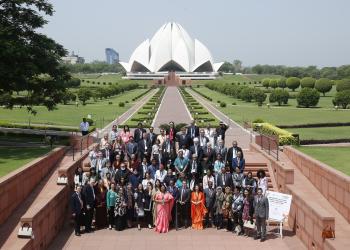G20’s Interfaith Forum Hosted by Baha’is & Partners at New Delhi House of Worship
The Baha’i International Community (BIC) hosted this week the G20 Interfaith Forum, titled Partnerships in Action: towards “One Earth, One Family, One Future,” between 7-9 May at in the Baha’i House of Worship in New Delhi, India. Joining the BIC in hosting the event were the Interfaith Alliance for Safer Communities and the G20 Interfaith Forum Association.
Before the IF20 Forum itself began, H.E. Harsh Vardhan Shringla, Chief Coordinator of India’s G20 Presidency, addressed those gathered for the discussions and offered remarks.
The Forum, also known as IF20, was founded in 2014 to bring together religious leaders, faith-inspired organizations, public officials, academics, and cultural organizations from all sectors to advance humanitarian values and understanding worldwide on issues from G20 agendas. Climate change, refugees, child dignity, the food crisis, trafficking, anti-racism initiatives, protecting cultural heritage, conflict resolution, tolerance, education, COVID recovery and more general health care reforms, social protection and humanitarian reforms, were all discussed.
“The G20 Interfaith Forum continues to be a uniquely unifying force, transcending differences and bringing together groups and individuals from faith traditions across the globe, to work together for the betterment of our common humanity,” said Bani Dugal, the BIC’s Principal Representative to the United Nations. “It has been a pleasure to hear from experts of both faith and non-faith backgrounds on the most pressing issues facing our world, as well as the potential solutions to these. It is my sincere hope that we can take the conclusions and outcomes of this forum and translate them into actions that will protect the most vulnerable in society and build capacity for them to flourish.”
Providing a continuing international platform, to explore ways in which religious communities can make meaningful contributions to global policy formation, is key to IF20’s work and the latest discussions held at the New Delhi Forum.
The Forum focused on the themes of India’s G20 Presidency: One Earth, One Family and One Future, and looked ahead to the G20 summit due to be hosted in India this coming September. Voices from historically underrepresented populations, such as minorities, women, children, and youth, as well as faith-based and interfaith organizations at local, national and international levels, were also included by the Forum organizers.
“The last two days have affirmed, yet again, that interfaith cooperation is a hugely effective medium for uniting people from across the globe,” said Dana Humaid AI Marzouqi, Chief Executive of Interfaith Alliance for Safer Communities. “This forum continues to demonstrate that diversity is our greatest strength, and that we can all work together, regardless of our background, to deliver meaningful change for the most vulnerable in society.”
“I was enormously encouraged by the discussions around child dignity—children are our future and we must do everything we can to allow them to live safe and fulfilling lives,” Ms. Al Marzouqi added. “What is essential is that we translate our efforts here into concrete action in wider society. I feel confident that having witnessed the passion, energy and determination of the forum’s participants, that we can speak as one voice and provide actionable recommendations to inform the G20 Summit in September.”
A core theme of the forum focused on leaving no one behind—especially those in the most vulnerable circumstances. The aim of the Forum, which Professor W. Cole Durham Jr., President of the G20 Interfaith Forum Association said had “served as a major landmark in this year’s continuous engagement with G20 process,” was to raise awareness of these issues and create substantive and policy recommendations for this year’s G20 process.
Future IF20 events will be held in Brazil in 2024 and South Africa in 2025.
Background
The G20 Interfaith Forum Association was launched in 2014, during Australia’s Presidency of the G20. It has progressed from a largely academic gathering timed to coincide with the G20 Summit to a sustained alliance of diverse religious leaders, practitioners from humanitarian, peacebuilding, and development organizations; and scholars. The underlying purpose is to contribute to global agendas through practical and ethical experience and wisdom of the world’s diverse religious communities, which are often absent from global forums. The extensive contributions of the “network of networks” as well as the prophetic voice and leadership of renowned religious leaders can enrich the G20 deliberations and contribute, alongside parallel and often interlinked constituencies (civil society, youth, business, etc.) to addressing the urgent problems facing the world and its leaders.
The Interfaith Alliance for Safer Communities was established to empower faith leaders to work for the safety and security of our communities, tackling issues such as child sexual abuse, extremism, radicalization and human trafficking. The IAFSC aims to facilitate the building of bridges between key stakeholders including faith communities, NGOs and experts in various domains. The IAFSC is conscious of the importance of empowering faith leaders, both at the institutional and grass-root levels, with knowledge, and to mobilize them to play a more active role in community safety.
The G20 Interfaith Forum seeks global solutions by collaborating with religious thought leaders and political representatives to help shape the overall G20 agenda. It draws on the vital roles that religious institutions and beliefs play in world affairs, reflecting a rich diversity of institutions, ideas, and values. Through its extensive network of networks, it helps prioritize key global policy goals and point toward practical means of implementation at every level of society.
